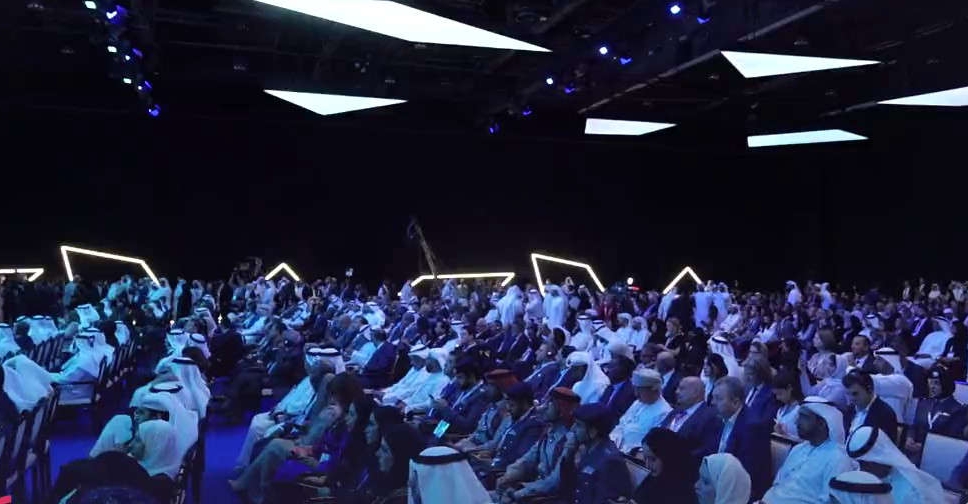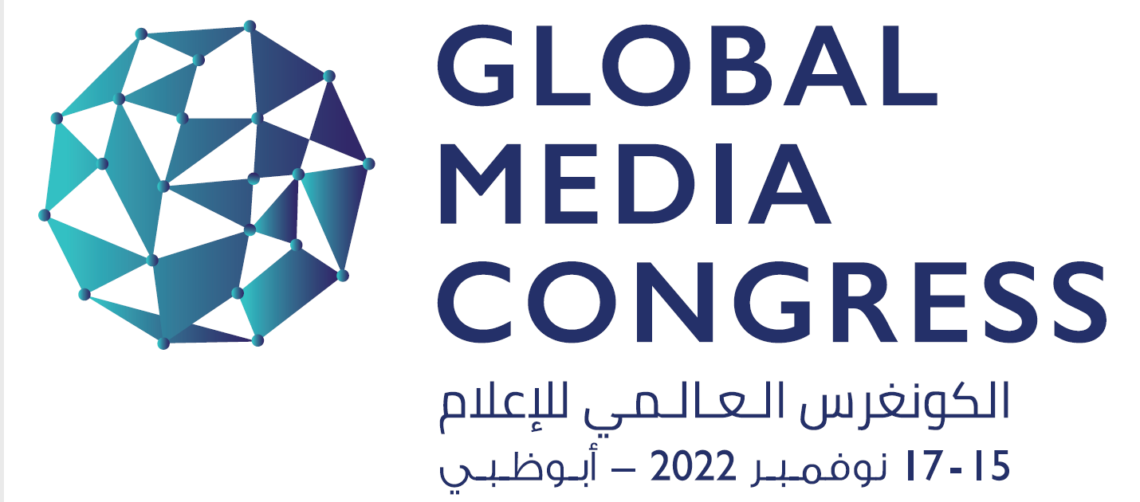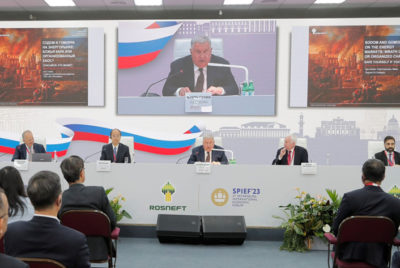Abu Dhabi, UAE, November 17, 2022: The third and final day of the Global Media Congress witnessed many discussion sessions that focused on a variety of topics, including the role of media in promoting national identity, diversity and inclusiveness in the digital age, the psychological aspect of consumers, and bridging the skills gap to keep up with the Fourth Industrial Revolution and beyond.
The activities of the third day began with a session in which His Excellency Saeed Al Attar, Director of the Media Office of the UAE Government, participated in a dialogue session that dealt with the role of media in promoting the national identity in light of the repercussions of cultural globalization, during which he engaged in discussions with Abdullah Abdul Karim, Acting Executive Director of the News Content Sector at the Emirates News Agency (WAM).
At the beginning of the session, His Excellency Saeed Al Attar thanked His Highness Sheikh Mansour bin Zayed Al Nahyan, Deputy Prime Minister and Minister of the Presidential Court, for his patronage of the Global Media Congress, which is organized by ADNEC Group in partnership with WAM.
His Excellency said that the Global Media Congress gathered media talents from the east and west of the world to discuss the challenges facing the sector and to work on crystallizing a forward-looking vision for its future, thanking WAM and ADNEC Group for organizing this distinguished global event.
The dialogue session began with a question about the importance of the role of the media, today more than ever, in consolidating national identity, where Al Attar said that the world today has changed, and we live in a state of economic globalization as well as cultural globalization, and according to global statistics, the average person spends 7 hours on the Internet each day. According to those statistics, people spent about 12 trillion hours on social networking sites and websites over the past year.
He pointed out that there is a cultural globalization that is spreading widely, as there are more than 200 entertainment platforms around the world with an audience of about 1.4 billion people, indicating that powerful countries have a strong national identity that they are proud of, and even seek to export to the world, and the UAE is one of the leading models on the global level of countries that are proud of their national identity.
Meanwhile, the dialogue session titled “Diversity and Inclusion in the Digital Age, Women in the Media,” shed light on the effective role of women in the media sector, with participants talked about the history of women in this sector and the difficulties they faced in entering it and making steady strides forward.
Participating in the session were Amelia Hoeks, Strategic Advisor and Executive Partner of Sustainable Development Goal 5 at the United Nations Global Compact Office, from the Netherlands; and Dr. Yemisi Akinbobola, award-winning journalist and academic, consultant, and co-founder of the African Women in Media Foundation, from Nigeria.
The speakers reviewed the statistics of the past years, which witnessed a greater turnout for women in this field, who achieved many successes in the media domain due to the shift in the societal view of them, as women have a greater screen presence now. The speakers also referred to the challenges that women still face, including inequality in employment and racial discrimination in some societies.
In a dialogue session titled “Shedding Light on Regional Media: South America,” the participants discussed the importance of media in all its forms and types in countering false and misinformed news, especially those related to policies and health affairs, and working to enhance the skills of journalists and media professionals and providing them with the necessary knowledge to enable them to differentiate between true and false news. Participants also pointed out the important role of modern technology in confronting such news, such as the use of the rapid response code in guiding readers and directing them to the correct sites for news sources.
Regarding the challenges facing media professionals in Latin America, the participants stressed that assassinations and killings come at the top of these challenges, in addition to the absence of freedom of speech, which compels media establishments to shoulder the responsibility to provide them with the necessary protection as much as possible and in the best ways to enable them to continue carrying out their tasks and to avoid media blackout.
During a session titled “The Great Resignation in the Media Sector”, the speakers discussed the changes taking place in the model used in journalism and media with the spread of technologies, and their role in changing society’s view of the world around us, stressing that the most important issue remains how to use these technologies in the most appropriate and correct manner, as new media era requires a diversity of skills and the ability to carry out several tasks simultaneously, all without neglecting the quality of the content and focusing on the message addressed to the public, especially youth who constitute the group that uses these technologies the most.
Meanwhile, a session on “Technology and Artificial Intelligence as a Tool to Improve Media Communication” addressed the role of Fourth Industrial Revolution technologies in developing the media work system.
Prof. Dr. Elsayed Darwish, Professor at the College of Communication and Media Sciences at Zayed University, from the UAE; Stefanodi Alessandri, CEO of the Italian ANSA news agency; Prof. Dr. Nizar Zaki, Director of the Big Data Analytics Center and Head of the Department of Computer Science and Software Engineering at the College of Information Technology at the UAE University, from the UAE; and Mr. Mohamed Al-Atef, Senior Regional Director of Wireless Communications Solutions at Huawei, participated in this session.
Prof. Dr. Elsayed Darwish talked about the industrial revolution’s stages of development up to the Fourth Industrial Revolution, with all its big data, blockchain, and artificial intelligence.
He talked about the positive effects of artificial intelligence technologies, which media institutions began adopting since the start of 2010, which included quality standards, and the ability of robots to present shows and newscasts, as there are press rooms that are fully equipped with artificial intelligence devices, in addition to converting texts into images and vice versa, producing multiple documents, Monitoring digital media performance, and meeting customer preferences according to their desires and needs, in addition to communicating with sources and verifying their credibility easily and effectively to improve profits and revenues.
In turn, Stefanodi Alessandri talked about the role of AI in enhancing the growth of his agency’s work despite the concerns of some journalists and employees, giving a realistic example of how the agency’s website dealt with publishing news based on blockchain technology during the global health crisis, as well as the method of employing AI in writing articles before having them reviewed by journalists and editors, which is of great benefit to the work.
Meanwhile, Prof. Dr. Nizar Zaki pointed out the importance of data as a main resource for all sectors, as journalists and media professionals use data to deliver their messages and understand the audience.
In turn, Prof. Muhammad Al Atef said that the use of AI in the media is very important, and that everyone should play a role in consolidating and increasing the effectiveness of technology, and he talked about the importance of employing AI technologies to support media by providing consistent content, and solving the problem of the language barrier through innovative translation solutions, for example.





